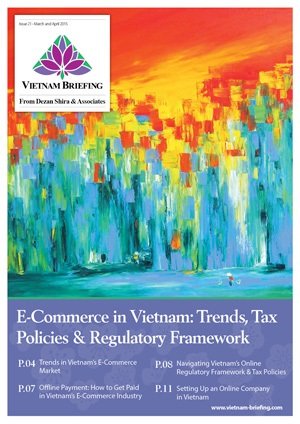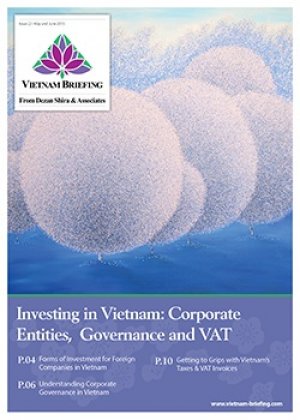Vietnam Lifts Foreign Ownership Cap on Public Companies
 New doors are being opened to foreign investors with the lifting of the foreign equity ownership cap on public companies on September 1, when Decree No. 60/2015/ND-CP comes into effect. The Decree provides guidance on the implementation of a number of articles of the Law on Securities.
New doors are being opened to foreign investors with the lifting of the foreign equity ownership cap on public companies on September 1, when Decree No. 60/2015/ND-CP comes into effect. The Decree provides guidance on the implementation of a number of articles of the Law on Securities.
Starting from September 1, foreign investors are permitted to buy shares and own charter capital without any cap if:
- their organization has been operating in the banking, insurance or securities sectors for at least two consecutive years before contributing capital to establish the organization or purchasing shares and contributed capital; and
- agencies specialized in banking, securities, and insurance overseas have signed either bilateral or multilateral agreements on information exchange, management, inspection and supervision of securities activities and securities market with the State Securities Commission.
Organizations which do not meet the above requirements and individuals may only own under 51 percent charter capital of a securities trading organization.
 RELATED: Vietnam’s Derivatives Market Continues Steady Development
RELATED: Vietnam’s Derivatives Market Continues Steady Development
Most public companies are no longer subject to any foreign equity caps unless they are:
- operating in a sector with a foreign equity limit specified in an international agreement with Vietnam;
- operating in a sector that is subject to legal restrictions on its foreign ownership ratio;
- operating in multiple industries with differing regulations regarding foreign equity cap.
Under Decree No.60, foreign investors are permitted to invest in stocks of securities investment companies or non-voting shares of public companies with no restrictions. However, the maximum total shareholding level of foreign investors still may not exceed 30 percent of the charter capital of Vietnamese commercial banks.
The foreign ownership ratio is defined as the equity held by foreign investors or by any organizations established in Vietnam, of which 51 percent of its charter capital is owned by foreign investors.
 RELATED: Dezan Shira & Associates’ Pre-Investment, Market Entry Strategy Advisory
RELATED: Dezan Shira & Associates’ Pre-Investment, Market Entry Strategy Advisory
As with the new Law on Enterprises and Law on Investment, which took effect this July, this long-awaited Decree is another key step in Vietnam’s opening up to foreign investors.
In June alone, the Vietnam Securities Depository (VSD) issued trading codes for 81 foreign investors, including 15 organizations and 66 foreign individual investors.
While Vietnam is still classified as a frontier market, this easing of foreign ownership restrictions will help build its case for an upgrade in its classification to an emerging market. When it was announced that MSCI would consider Qatar and the UAE as emerging markets in 2013, their benchmark equity gauges jumped at least 38 percent in the following twelve months.
|
Asia Briefing Ltd. is a subsidiary of Dezan Shira & Associates. Dezan Shira is a specialist foreign direct investment practice, providing corporate establishment, business advisory, tax advisory and compliance, accounting, payroll, due diligence and financial review services to multinationals investing in China, Hong Kong, India, Vietnam, Singapore and the rest of ASEAN. For further information, please email vietnam@dezshira.com or visit www.dezshira.com. Stay up to date with the latest business and investment trends in Asia by subscribing to our complimentary update service featuring news, commentary and regulatory insight. |
Investing in Vietnam: Corporate Entities, Governance and VAT
In this issue of Vietnam Briefing Magazine, we provide readers with an understanding of the impact of Vietnam’s new Laws on Enterprises and Investment. We begin by discussing the various forms of corporate entities which foreign investors may establish in Vietnam. We then explain the corporate governance framework under the new Law on Enterprises, before showing you how Vietnam’s VAT invoice system works in practice.
E-Commerce in Vietnam: Trends, Tax Policies & Regulatory Framework
In this issue of Vietnam Briefing Magazine, we provide readers with a complete understanding of Vietnam’s e-commerce industry. We begin by highlighting existing trends in the market, paying special attention to scope for foreign investment. We look at means for online sellers to receive payment in Vietnam, examine the industry’s tax and regulatory framework, and discuss how a foreign retailer can actually establish an online company in Vietnam.
 Tax, Accounting, and Audit in Vietnam 2014-2015
Tax, Accounting, and Audit in Vietnam 2014-2015
The first edition of Tax, Accounting, and Audit in Vietnam, published in 2014, offers a comprehensive overview of the major taxes foreign investors are likely to encounter when establishing or operating a business in Vietnam, as well as other tax-relevant obligations. This concise, detailed, yet pragmatic guide is ideal for CFOs, compliance officers and heads of accounting who need to be able to navigate the complex tax and accounting landscape in Vietnam.
- Previous Article State by State: Vietnam and Virginia Trade
- Next Article State by State: Vietnam and Arizona Trade










